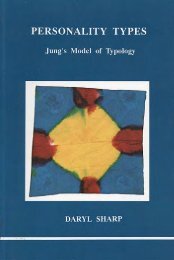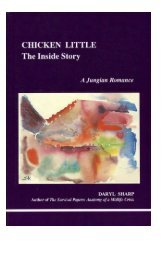Digesting Jung: Food for the Journey - Inner City Books
Digesting Jung: Food for the Journey - Inner City Books
Digesting Jung: Food for the Journey - Inner City Books
You also want an ePaper? Increase the reach of your titles
YUMPU automatically turns print PDFs into web optimized ePapers that Google loves.
54 Relationship Problems in a Nutshell<br />
what you deserve.<br />
The endless bla<strong>the</strong>r that takes place between two complexed<br />
people solves nothing. It is a waste of time and energy and as often<br />
as not actually makes <strong>the</strong> situation worse.<br />
Of course, as <strong>Jung</strong> points out in <strong>the</strong> passage that heads this chapter,<br />
<strong>the</strong> meeting between anima and animus is not always negative.<br />
In <strong>the</strong> beginning <strong>the</strong> two are just as likely to be starry-eyed lovers.<br />
Later, when <strong>the</strong> bloom is off <strong>the</strong> rose, <strong>the</strong>y may even become fast<br />
friends. But <strong>the</strong> major battles in close relationships occur because<br />
<strong>the</strong> man has not withdrawn his anima projection on <strong>the</strong> woman,<br />
and/or <strong>the</strong> woman still projects her animus onto <strong>the</strong> man.<br />
We may understand this intellectually, but when our loved one<br />
does not behave according to <strong>the</strong> image we have of him or her, we<br />
are instantly complexed. Our emotions override what is in our<br />
minds. Our reactions run <strong>the</strong> gamut from violence to anger to<br />
grieved silence, and it is bound to happen again, with this one or <strong>the</strong><br />
next, unless we reflect on what is behind it: our own psychology.<br />
Finally, <strong>the</strong> reality must be faced that no one relationship can<br />
fulfill all our needs, as individuals, all of <strong>the</strong> time. One partner or<br />
o<strong>the</strong>r may in time, <strong>for</strong> reasons of <strong>the</strong>ir own, feel drawn to intimacy<br />
with ano<strong>the</strong>r.<br />
Such situations are of course fraught with conflict, both inner<br />
and outer, but need not split <strong>the</strong> two asunder. The feeling function<br />
must rule <strong>the</strong> day: What is my long-standing relationship worth to<br />
me? If it is important enough to both, and where love is not wanting,<br />
it will survive <strong>the</strong> turmoil, becoming all <strong>the</strong> richer <strong>for</strong> <strong>the</strong><br />
struggle, and <strong>the</strong> partners more conscious of who <strong>the</strong>y are. 37<br />
The pre-requisite <strong>for</strong> a good marriage, it seems to me,<br />
is <strong>the</strong> licence to be unfaithful. 38<br />
37 For more on this <strong>the</strong>me, see <strong>Jung</strong>’s comments on “<strong>the</strong> container and <strong>the</strong> contained”<br />
in “Marriage As a Psychological Relationship,” The Development of Personality,<br />
CW 17, pars. 331ff.; also Sharp, Getting To Know You: The Inside Out of<br />
Relationship, pp. 107ff.<br />
38 <strong>Jung</strong>, in William McGuire, ed. The Freud/<strong>Jung</strong> Letters, p. 175..










